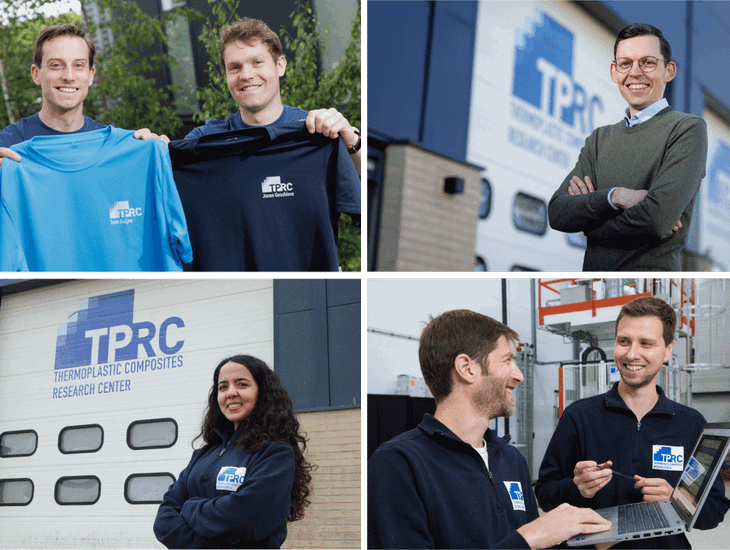#TPRCminds: Jagadeesh Swamy
“Twente is the place to be when it comes to thermoplastic composites.”
In the Netherlands, Jagadeesh Swamy became fascinated by thermoplastic composites. He continued his mission at the TPRC, where he is keen on experimenting with new materials – and also on the liquorice jar. Jagadeesh wants to use his expertise to create a more sustainable industry.
The TPRC has recently celebrated its tenth anniversary. The TPRC, which started out small with just a few researchers, has since developed considerably. The key to this success? TPRC’s people, without whose expertise and drive there would be no future. Read other #TPRCminds interviews with Jeroen (Research Engineer), Wouter (Assistant professor), Yannick (PhD Researcher), Ramona (PhD Researcher), Sebastiaan (AniForm Engineering), Vanessa (PhD Researcher), and Emiel (Research Engineer).
After completing his Bachelor’s in Engineering in his birthplace Bangalore, a city of millions in India, Jagadeesh continued his studies at TU Delft. “I’d always found aerospace engineering and aircraft building enormously interesting, and in Delft you’re in the right place for it,” he explains. “It took a while to get used to things here, including the directness of the Dutch. At the same time everyone was really open, and that helped me to become fascinated by thermoplastic composites, materials that are gradually gaining ground in the aviation industry. Delft may be ideal for aerospace engineering, but Twente is the place for thermoplastic composites, thanks to the combination of the University of Twente and the TPRC. I decided to begin my career here at the TPRC, first spending a year as a research engineer and now, since recently, continuing as a PhD student.”
The issues that arise in the industry
Jagadeesh stays in close touch with the aerospace industry. His research forms one piece of a larger puzzle, namely transitioning to the cost-efficient production of thermoplastic composites for aircraft parts. “I have a feeling that I, and all of us here at the TPRC, can make a difference, and be really important to that transition. That has inspired me, and that’s why I wanted to come here. In the Netherlands, and especially in Twente, we’re ahead of the field. Our collaboration with partners like GKN Fokker, Toray Advanced Composites and Coriolis Composites is remarkable – you don’t see that very often. The fusion of industrial application and academic knowledge at the TPRC is unique. And my research question is directly based on the current issues in the industry.”
What have you found at the TPRC?
“Here I can devote myself to research questions in a laboratory setting that is not just directly linked to industry, but which is also young, dynamic and multicultural. I’m in my element here. Many of my fellow researchers at the TPRC are relatively young – there are always lots of students and graduates around. We have different cultural backgrounds, but we have lots of interests in common. I’m the only Indian, but I have colleagues from Asia and from many different European countries. We’re all inquisitive, we learn a lot from one another and we laugh a lot.”
What else did you have to get used to, besides Dutch directness?
“During my first stay in the Netherlands I had to get used to the practical nature of my work. Things are different in India, although of course I didn’t yet have a serious full-time job there. In India I acquired a lot of theoretical engineering knowledge, but it was here that I started really putting it into practice. What I can teach my colleagues here...? Oh, you’ll have to ask the others,” he says modestly.
At the TPRC Jagadeesh soon noticed the absence of India’s hierarchical business culture. “The organisation is transparent and horizontal. If I have a problem or a question, I can directly approach anyone, including the management. That’s a really good thing.”
Sustainability
Jagadeesh is actively concerned with the sustainable future of his professional field. Wherever in the world he chooses to continue his career, he hopes to be able to contribute towards the wider use of thermoplastic composites. “Not just in the aircraft or car manufacturing industries, but perhaps also for exoskeletons, for instance – powered exoskeletons. There, too, it’s all about sustainable, lightweight materials.”
“Actually, the sustainability aspect has been comparatively neglected. Thermoplastic composites can be reused and reshaped. Thermosetting materials are currently cheaper, but much more difficult to recycle. So for these reasons, too, thermoplastic composites are an important alternative. If I can show that thermoplastic composites can be produced increasingly efficiently, with less wastage, lower lead times, and of course cost effectively, then I can contribute, indirectly, to a more sustainable world. There’s a chance that sooner or later I will return to India, and if I do, I hope to be able to continue the mission I’m working on here. Thermoplastic composites are still in their infancy in India, but at the same time there is an enormous demand for them – though industry itself is not yet always aware of it. If I go back, I’ll certainly miss the Netherlands and the TPRC. I’ll miss the liquorice, too – there’s always a big jar of it at the TPRC. At first I found them disgusting, but now I’m addicted.”
#TPRCminds
Our series #TPRCminds introduces you to the people behind our success. Who are they? What is their background? What drives them and what do they dream about? How do they look at the future of thermoplastic composites? Continue reading other #TPRCminds episodes:
Photos ©Gijs van Ouwerkerk




